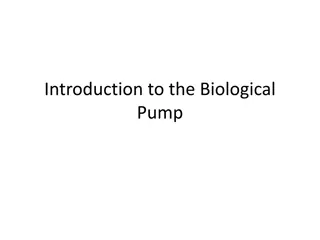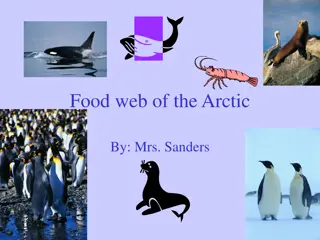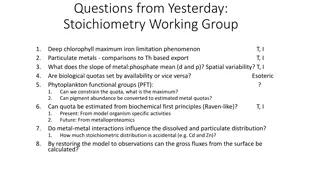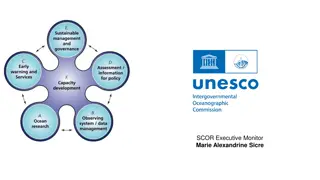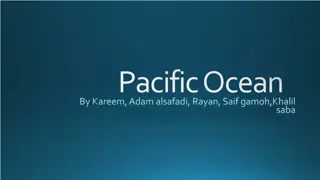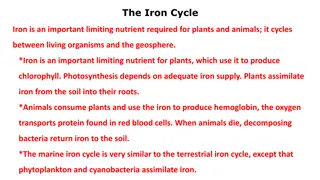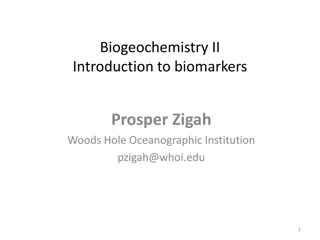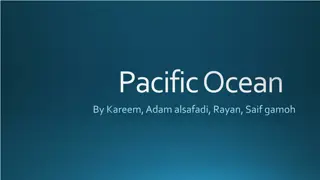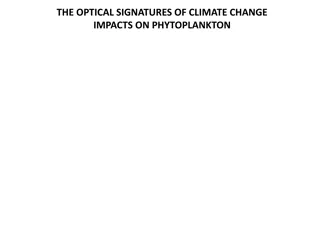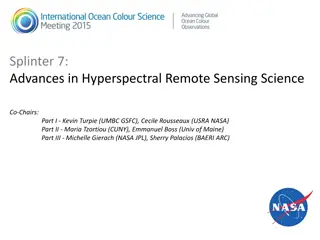The Role of Sunlight, Ozone, and Plant Life in Earth's Atmosphere
Sunlight plays a crucial role in the formation of ozone from oxygen, leading to the protection of plant life against harmful UV radiation. The ozone produced by sunlight helps in the photosynthesis process of plants, which in turn release oxygen, absorb CO2, and contribute to the overall balance of
7 views • 23 slides
Shallow Habitats Data Analysis & Project Updates
Conducting initial data analysis in shallow habitats to understand factors affecting phytoplankton composition and dissolved oxygen levels. Priority issues include assessing biomass signals, harmful algal blooms, and the role of nutrients. Key questions focus on low dissolved oxygen impact on fish a
0 views • 24 slides
Understanding the Biological Pump and Carbon Cycle in the Ocean
The biological pump in the ocean involves photosynthesis by phytoplankton, which removes carbon dioxide from the atmosphere, and respiration, where some CO2 is released back. Phytoplankton are crucial in the ocean's carbon cycle, with primary consumers like zooplankton depending on them for energy.
0 views • 20 slides
Arctic Food Web: A Fascinating Ecosystem of Interconnected Life
Explore the intricate Arctic food web, starting with phytoplankton and zooplankton as primary producers, followed by krill as a key species, which are in turn eaten by fish, squid, and eventually penguins. Learn about the diverse marine life and their roles in this fragile ecosystem.
0 views • 9 slides
Insights on Biogeochemical Processes and Metal Interactions in Marine Environments
Delve into the intricate relationships between metals, stoichiometry, and biological quotas in marine ecosystems. Explore the impact of metal interactions on biogeochemical provinces, resource supply stoichiometry, and the constraints they impose on marine biota. Uncover how deep chlorophyll maxima,
0 views • 5 slides
Collaborative Research Programmes in Ocean Science
Collaboration between the International Oceanographic Commission (IOC) and the Scientific Committee on Oceanic Research (SCOR) has led to successful research initiatives focusing on topics like Harmful Algal Blooms, Global Trends of Phytoplankton, Multiple Ocean Stressors, Microplastics, and more. O
0 views • 7 slides
Conservation Efforts in the Pacific Ocean
The Pacific Ocean is home to diverse marine life, including endangered species like the dugong and the vaquita. By raising awareness about the importance of protecting these animals and their habitats, such as seagrass beds, we can contribute to their conservation. Additionally, learning about phyto
0 views • 6 slides
The Iron Cycle and Aquatic Microbiology
Iron plays a crucial role in terrestrial and marine ecosystems, cycling between living organisms and the geosphere. It is a vital nutrient for plants, essential for chlorophyll production, and for animals, needed to create hemoglobin. The marine iron cycle involves phytoplankton and cyanobacteria as
0 views • 19 slides
Advanced Biomarker Analysis in Biogeochemistry Studies
In biogeochemistry research, advanced analytical techniques are utilized to isolate and separate organic matter, focusing on major carbon pools in bodies of water like Lake Superior. Biomarkers such as fatty acids and specific compounds are identified as indicators for various microbial processes, i
0 views • 11 slides
Marine Life Conservation and Diversity
Explore the beauty and importance of marine life through stunning images and informative descriptions of the Pacific Ocean, dugongs, vaquitas, phytoplankton, and Phyllospadix japonicus. Learn about endangered species and the threats they face, as well as simple actions we can take to protect our oce
0 views • 6 slides
Optical Signatures of Climate Change Impacts on Phytoplankton
Explore the optical signatures of climate change impacts on phytoplankton through images showing differences in primary production, reflectance ratios, community changes, and trends in various oceanic regions. The data visualizations provide insights into the effects of climate change on phytoplankt
0 views • 10 slides
Exploring Advances in Hyperspectral Remote Sensing Science for Aquatic Environments
This conference focuses on the latest developments in hyperspectral remote sensing technology for studying aquatic environments. With sessions covering topics like atmospheric correction, ocean color imagery, and water quality monitoring, experts discuss how hyperspectral data can address critical s
0 views • 8 slides


